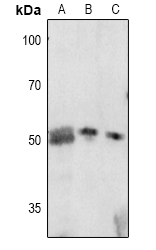Product Name :
p57 Kip2 (Phospho-T310) polyclonal antibody Background :
p57 / Kip 2 (or CDKN 1C) is a potent tight binding inhibitor of several G1 cyclin complexes, and is a negative regulator of cell proliferation. The gene encoding human p57 / Kip 2 is located on chromosome 11p15.5, a region implicated in both sporadic cancers, Wilm's tumor, and Beckwith Wiedemann syndrome (BWS, a cancer syndrome) making it a tumor suppressor candidate. BWS is characterized by numerous growth abnormalities and an increased risk of childhood tumors. Several types of childhood tumors including Wilms' tumor, adrenocortical carcinoma and rhabdomyosarcoma display a specific loss of maternal 11p15 alleles, suggesting that genomic imprinting plays an important part. This region also contains two other imprinted genes, insulin like growth factor II (IGF II) and H19, both of which seem to be implicated in adrenal neoplasms. Product :
Rabbit IgG, 1mg/ml in PBS with 0.02% sodium azide, 50% glycerol, pH7.2 Storage&Stability :
Store at 4°C short term. Aliquot and store at -20°C long term. Avoid freeze-thaw cycles. Specificity :
p57 Kip2 (Phospho-T310) polyclonal antibody detects endogenous levels of p57 Kip2 protein only when phosphorylated at Thr310. Immunogen :
Synthetic phosphopeptide derived from human p57 Kip2 around the phosphorylation site of Threonine 310. Conjugate :
Unconjugated Modification :
Phosphorylation
p57 Kip2 (Phospho-T310) polyclonal antibody Background :
p57 / Kip 2 (or CDKN 1C) is a potent tight binding inhibitor of several G1 cyclin complexes, and is a negative regulator of cell proliferation. The gene encoding human p57 / Kip 2 is located on chromosome 11p15.5, a region implicated in both sporadic cancers, Wilm's tumor, and Beckwith Wiedemann syndrome (BWS, a cancer syndrome) making it a tumor suppressor candidate. BWS is characterized by numerous growth abnormalities and an increased risk of childhood tumors. Several types of childhood tumors including Wilms' tumor, adrenocortical carcinoma and rhabdomyosarcoma display a specific loss of maternal 11p15 alleles, suggesting that genomic imprinting plays an important part. This region also contains two other imprinted genes, insulin like growth factor II (IGF II) and H19, both of which seem to be implicated in adrenal neoplasms. Product :
Rabbit IgG, 1mg/ml in PBS with 0.02% sodium azide, 50% glycerol, pH7.2 Storage&Stability :
Store at 4°C short term. Aliquot and store at -20°C long term. Avoid freeze-thaw cycles. Specificity :
p57 Kip2 (Phospho-T310) polyclonal antibody detects endogenous levels of p57 Kip2 protein only when phosphorylated at Thr310. Immunogen :
Synthetic phosphopeptide derived from human p57 Kip2 around the phosphorylation site of Threonine 310. Conjugate :
Unconjugated Modification :
Phosphorylation
-
 Western blot (WB) analysis of p57 Kip2 (Phospho-T310) polyclonal antibody at 1:500 dilution LaneA:K562 whole cell lysate LaneB:Hela whole cell lysate LaneC:HEK293T whole cell lysate
Western blot (WB) analysis of p57 Kip2 (Phospho-T310) polyclonal antibody at 1:500 dilution LaneA:K562 whole cell lysate LaneB:Hela whole cell lysate LaneC:HEK293T whole cell lysate
Bioworld Biotech only provide peptides for our antibodies and do not provide additional peptide customization services.
Price/Size :
USD 368/1mg/vial
Tips:
For phospho antibody, we provide phospho peptide(0.5mg) and non-phospho peptide(0.5mg).Describe :
Blocking peptides are peptides that bind specifically to the target antibody and block antibody binding. These peptide usually contains the epitope recognized by the antibody. Antibodies bound to the blocking peptide no longer bind to the epitope on the target protein. This mechanism is useful when non-specific binding is an issue, for example, in Western blotting (WB) and Immunohistochemistry (IHC). By comparing the staining from the blocked antibody versus the antibody alone, one can see which staining is specific; Specific binding will be absent from the western blot or IHC performed with the neutralized antibody.Formula:
Synthetic peptide was lyophilized with 100% acetonitrile and is supplied as a powder. Reconstitute with 0.1 ml DI water for a final concentration of 10 mg/ml.The purity is >90%,tested by HPLC and MS.
Storage:
The freeze-dried powder is more stable. For short time at 2-8°C. For long term storage store at -20°C.
Note :
This product is for research use only (RUO only). Not for use in diagnostic or therapeutic procedures.
 p57 Kip2 (Phospho-T310) polyclonal antibody
p57 Kip2 (Phospho-T310) polyclonal antibody  Datasheet
Datasheet COA
COA MSDS
MSDS SHIP
SHIP